Jim Burke
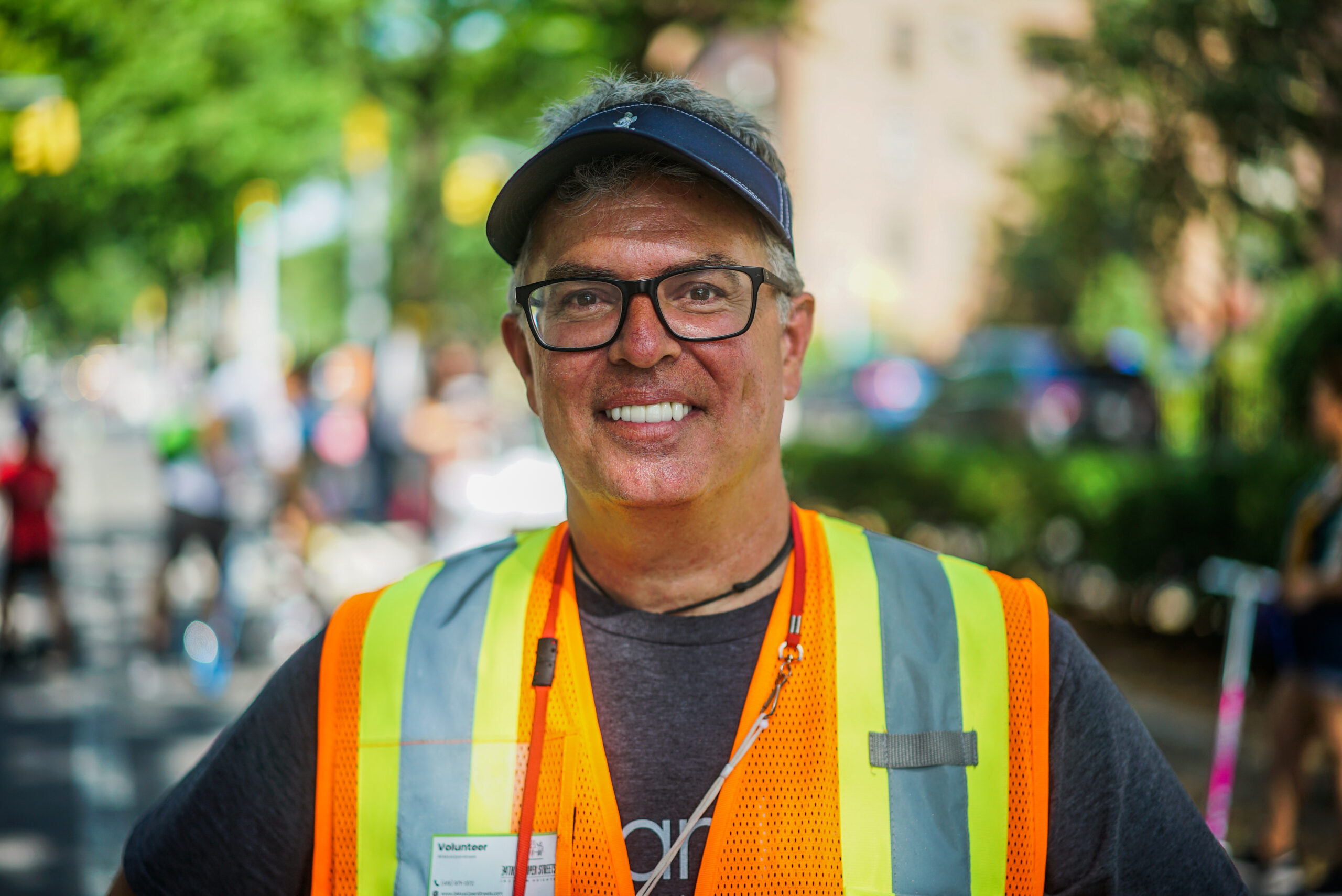
A long-time safe streets activist, Jim regularly devoted time to volunteering after work, and in 2020 he had more time on his hands than ever. He had taken a sabbatical in 2019, and because of the pandemic, the job that he planned to return to no longer existed. With his sabbatical stretching forward indefinitely, he helped his friend Nuala O'Doherty-Naranjo with a mutual aid program she started, the COVID Care Neighborhood Network. One day in April 2020 found him in Nuala's basement with other volunteers, including Leslie Ramos, the executive director of the 82nd Street Business Improvement District (BID), when Leslie got a call from the police.
The Open Streets program was about to start. Mayor de Blasio had delegated responsibility to the Department of Transportation and local police precincts. In many neighborhoods, the police partnered with a local BID to take over daily management of the streets. The 115th Precinct called Leslie to ask if the 82nd Street BID could take on the duties for the 34th Avenue Open Street, but Leslie explained that they lacked the staff to clean the street and move the barricades each day.
Jim and Nuala jumped in: "We'll do it!" They'd both been advocating for safe streets in their home of Jackson Heights for years, and recognized that this was a special moment in time. Eager to show that the community could manage 34th Avenue without police presence and determined to make their local Open Street a success, they called a dozen local groups – including Queens Transportation Alternatives, where Jim is volunteer chair for Queens, and the Jackson Heights Beautification Group, where Nuala had served as a past president – and wrangled up volunteers. They formed the 34th Ave Open Streets Coalition to make it work.
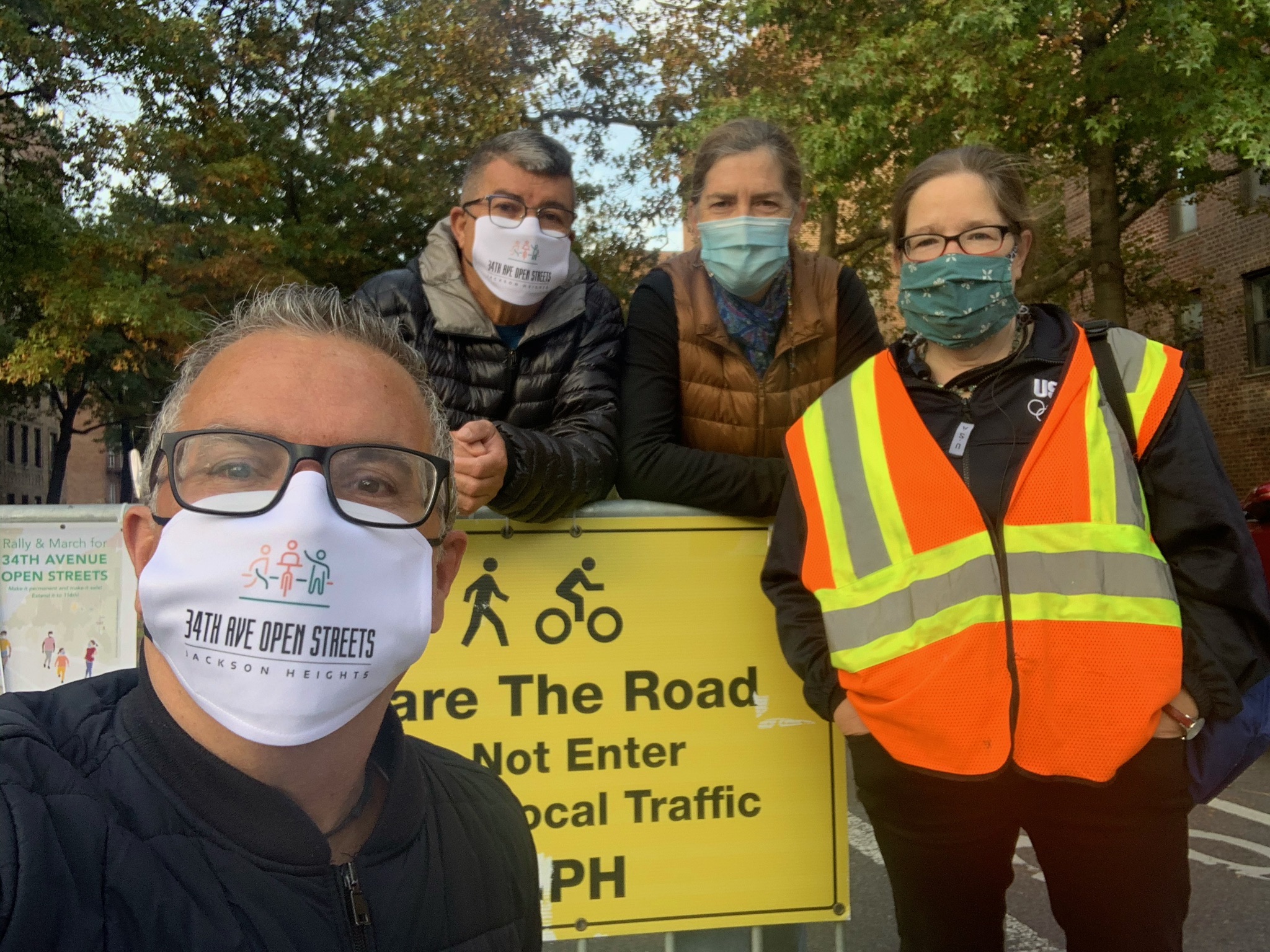
The NYPD provided barricades, and beginning on May 1st, Coalition volunteers put them in place, hanging up signs that read “Do Not Enter Except Local Traffic, 5MPH.”
Now, at 8:00 every morning, volunteers move barricades to block cars from entering 34th Avenue between 69th Street and Junction Boulevard, 26 blocks. Every evening at 8:00 p.m. they remove them. Rita Wade, who has been picking up trash and moving barricades as a Coalition volunteer since day one, said, “It’s kind of magical. At 8:00 suddenly people appear from their buildings and start walking or jogging. It’s like a dance.”
In the interview excerpt below, Jim speaks about how the Open Street brought new relationships into his life and helped combat isolation during the pandemic:
Click to Read Transcript
Jim: I've met more people in this last year than in the prior two decades that I've lived here. Some of my best friends now are people that I didn't know 13 months ago, 15 months ago. And I met them all through the Open Streets, either fellow volunteers, neighbors. And that's been one of the most wonderful things that's happened.
I have friends in other parts of the city, some of whom fell into deep depression, some of whom felt very isolated or alone. This neighborhood, COVID hit us hard in March, and badly. And we lost a lot of people. A lot of people got sick. But after that, we really all came together, and so many wonderful things have happened since then. And we were able to not feel isolated, because we had each other. And I think that made a big difference. That was worth working seven days a week for.
Bridget: Yeah.
Jim: And I was not the only one; that's the other thing. There were many other people committing seven days a week. Rita, seven days a week. Nuala, seven days a week. Oscar, seven days a week. Miguel, who was our barricade volunteer, seven days a week. You know, I can go on and on. These people, lots of people really stepped up and worked hard, either on closing and opening our streets in the mornings; none of the other things could happen without that happening. And then we had a lot of people who really devoted--and still do--a big portion of their day to making sure that Open Streets is successful. And we had a lot of people that, maybe from the outside, like, "How could you devote that many days?" Because people, it was really worth it to them. That made a big difference.
I think that 34th gave, for the people who are involved in it, a really strong sense of community. As opposed to before, like, you had no interaction with the people who lived here, even though you've lived here for a long, long time, you wouldn't necessarily know them very well.
And all of a sudden, this whole world opens up and you're like, "Wait, I know you." Like, you see them, you've hung out with them. You've done exercise class with them. You've practiced English with them. You've jump roped with their kids, played Sapo with them. And it's really such a much nicer place to live now. That's my favorite part of this whole thing.
After talking to neighbors to find out what they wanted on the street, Nuala and Jim hired local instructors to lead free Zumba, Pilates, salsa, yoga, and English conversation classes. Every day, weather permitting, the Coalition holds free classes for adults and activities for children, like games, races, and slime-making workshops. They organize free cultural events, including music and dance performances, and art exhibits. The Coalition covers the costs of all this, about $1,000 per month, with small grants and donations.
Here, Jim describes his favorite activity:
Click to Read Transcript
Bridget: So, from the many activities that you have been part of on 34th Avenue, could you tell me a story about one of your favorites?
Jim: Ooh, I have so many favorites. I think, I think the races. Now, again, we started that in the winter because we needed an activity that you can do in 20 degree weather.
One of the reasons I love it, first of all, we got great participation. We got kids of all ages. We have two cheerleaders. And they're probably late seventies, eighties, the women who help us cheerlead. And they have complete with the pom-poms and everything, to cheer on the kids. We have other adults that help just make sure that the street is completely free of cars, or that if there is a bicyclist or there is someone coming down, that they're cognizant of the children and are careful. So, it's a big community undertaking. Lots of volunteers come.
And the joy, the kids--I think it was last week or the week before, we did, like, twelve races, and you race and you go through an obstacle course, and it's just amazing how much they enjoy it. And then at the end, we give them all a medal. It looks like the Olympics at the end, and then the kids are so happy walking away with their medals.
I think that gives me the most joy, because the kids really, really love it. And then to see all these other, you know, the other people participating and helping volunteer doing it. And this all was the idea of a 13-year-old boy who also helps participate and helps with the races. So it's just, I think it's just wonderful.
Oh, I know another favorite one. We had the moms and the dads join us, and the moms did a race, and then with the dads--there's only a couple of guys. And the kids were absolutely hysterical, laughing, clapping, rooting on their moms and dads. And you know what, that's my favorite. Cause the kids, watching the kids watching their parents run was amazing and a lot of fun.
On one of the last warm afternoons of late October 2020, people sat on the curb of 34th Avenue’s tree-studded median eating late lunches, soaking up the weakened October sun. Others jogged, strolled, rollerbladed, or pushed baby carriages by. They passed road closure barricades pasted with advertisements for a rally to make the Open Street permanent, placards planted in the dirt of the medians declaring “No es demasiado tarde, complete el censo hoy!” (“It’s not too late, complete the census today!”), and NYPD signs offering a cash reward for information about a recent shooting.
Near the corner of 93rd Street, Jim, Nuala, and Jim's partner, Oscar Escobar, set up wooden chairs around the median. They were preparing to teach a drop-in ESL class, which meets most weekdays at 3:45pm.
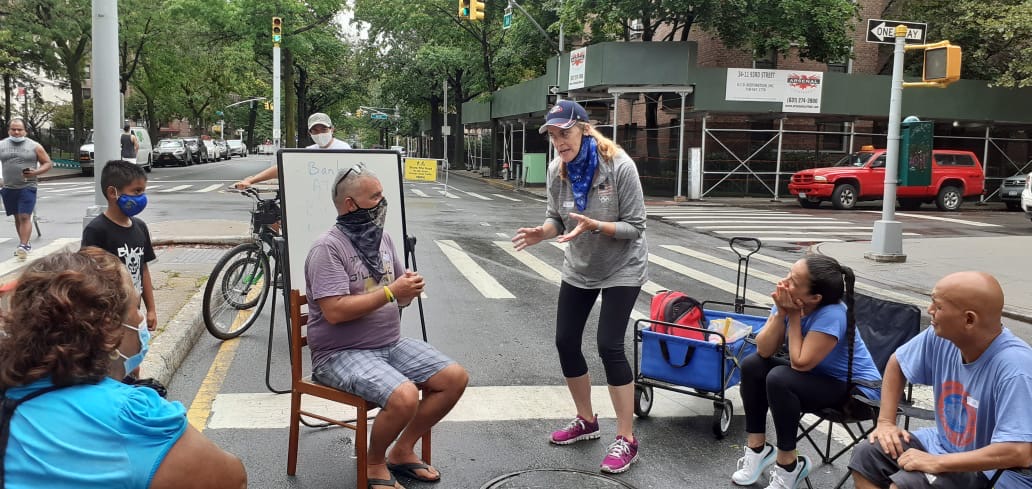
Students began trickling in. Masks covered everyone’s mouths, but their eyes crinkled in smiles as they greeted each other. A young mother approached with a boy of around five hefting a Spider Man backpack, and a girl of about seven clutching a Barbie. Nuala beckoned them over, and they sat amid the fallen yellow leaves on the median. At first the children were shy, but when Nuala asked a question, they shot up their hands, fingertips quivering with eagerness to answer. Jim threw his head back and laughed, delighted by their enthusiasm.
They began discussing holidays. Jim translated to Spanish for a student who was confused, and she nodded. But the children were not satisfied with his cursory explanation. They elaborated, a jumble of words and gesticulations pouring out of both of them at the same time. Laughing, Jim lifted asked them, "What's your favorite holiday?" The boy leapt to his feet, jumping up and down while extolling the virtues of Christmas, and having exhausted himself with the manic delivery of his answer, dramatically fell backwards onto the median, cushioned by his backpack.
The discussion and laughter continued until the clock struck 4:45 pm and the lesson was over. Students and teachers stood and chatted before eventually parting ways with elbow bumps. Jim, Nuala, and Oscar picked up yoga mats from an earlier exercise class and piled them onto a small cart, along with a clipboard and markers they used in the class.
A little girl in a sparkly dress twirled in the street, a man rode by on a bike with a radio blasting a Spanish ballad, a teenage boy on a skateboard fell while attempting a trick, and the activity of the Open Street swallowed up Jim, Nuala, and Oscar as they carried their chairs home.
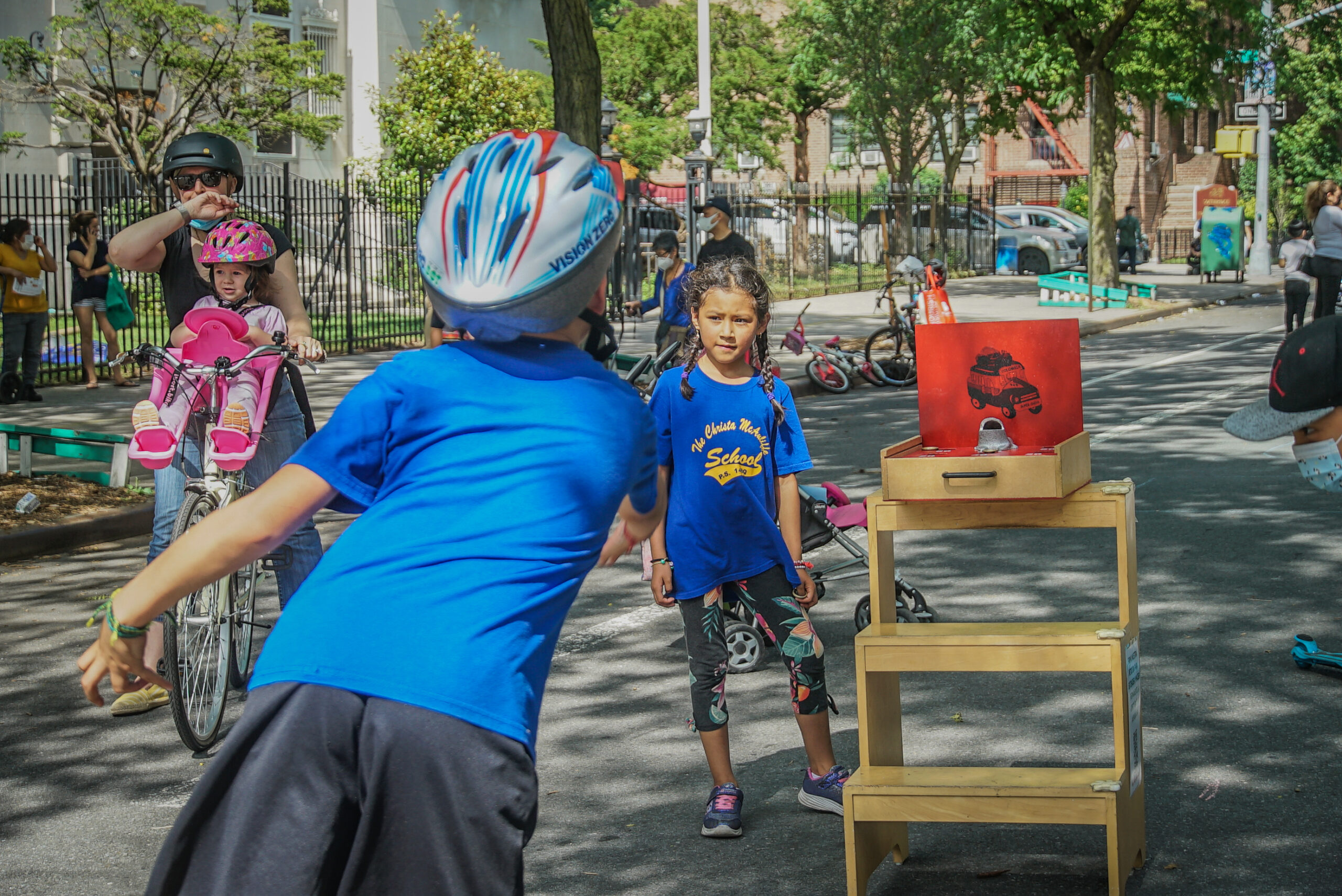
For their afternoons on 34th, Oscar often brings sapo, a traditional South American game where players try to toss coins into the mouth of a frog, and Jim officiates sapo tournaments. The metal coins tend to bounce off the sides of the game board, ricocheting into the street, and Jim and the children shimmy under cars to retrieve the game pieces.
Previously, Jim had never worked with children, or even thought much about them. That changed as he helped with sapo games, taught neighborhood children how to ride bikes, and succumbed to their infectious enthusiasm. “All those kids motivate me,” he reflected in November 2020. “We’re all caught up in the election, the pandemic, and people dying. And these kids are having a great time on their street. They’re so full of joy.”
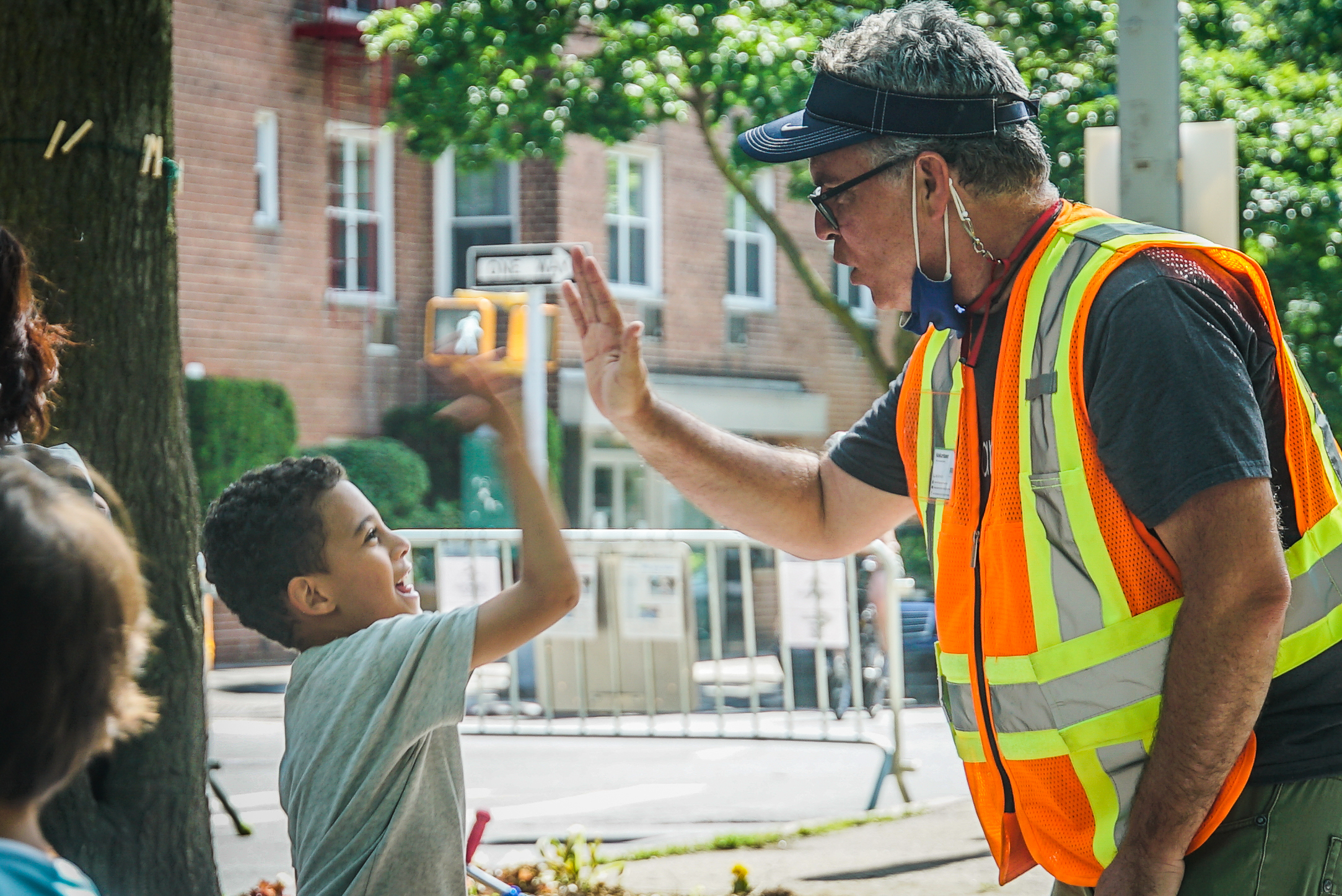
For months, Jim jumped rope and ran up and down the street with the many neighborhood children who adore him. But he had never shaken the fatigue that plagued him since contracting COVID the previous March. “I was full of joy every day, even though I was tired. I wanted to fight through it. I thought I would overcome the exhaustion,” he said. “I didn’t know that my blood was not traveling to my heart.”
Jim had been helping to plan a rally on October 24th to advocate for extending the 34th Avenue Open Street and making it permanent (the city had originally planned for the Open Streets initiative to last only until October 31, 2020). Two days before the rally, while moving barricades one morning, Jim suddenly felt as if someone were sitting on his chest. Nuala and Rita happened to be nearby and saw him lie down in the street. While Rita waited with him, Nuala knocked on doors to get him aspirin, then called her son, who drove them to nearby Elmhurst Hospital, where Jim was diagnosed with a heart attack.
The day of the rally, as Councilmember Daniel Dromm announced that he had come to an agreement with the DOT to make the Open Street permanent, Jim was still recovering in the hospital. Local politicians at the rally commended his contributions, and Assemblymember Catalina Cruz called him “the Mayor of 34th Avenue.”
Jim was released six days later, and the very next morning found him back out on 34th greeting friends. “Everybody has been very nice,” he said later, tearing up. “It felt really good.”
A week later, feeling somewhat dizzy, perhaps because of his heart medication, Jim leaned on his cane as he turned down 34th Avenue and headed to 93rd Street, the base of operations for the Coalition’s activities. Instead of joining Oscar and children at the sapo game, as he used to, he sat on a folding chair and watched a nearby Pilates class and the kids playing. A steady stream of adults and children flocked around him. “Estoy un poco cansado,” he told a concerned neighbor - I’m a little tired.
Six-year-old Delilah ran over to Jim, slapped a high five, then stood behind him and squealed, “You can’t see me!” “I have no idea where you are!” Jim played along.
Oscar kept points for the sapo game and made sure the players took turns. Children chased each other and drew with chalk while their mothers practiced pilates. Across the street, people lined up outside P.S. 149 elementary school for free community meals being distributed through the Department of Education. The line for food ebbed and flowed, but never ended.
Feeling unwell, Jim went home before the English conversation class started.
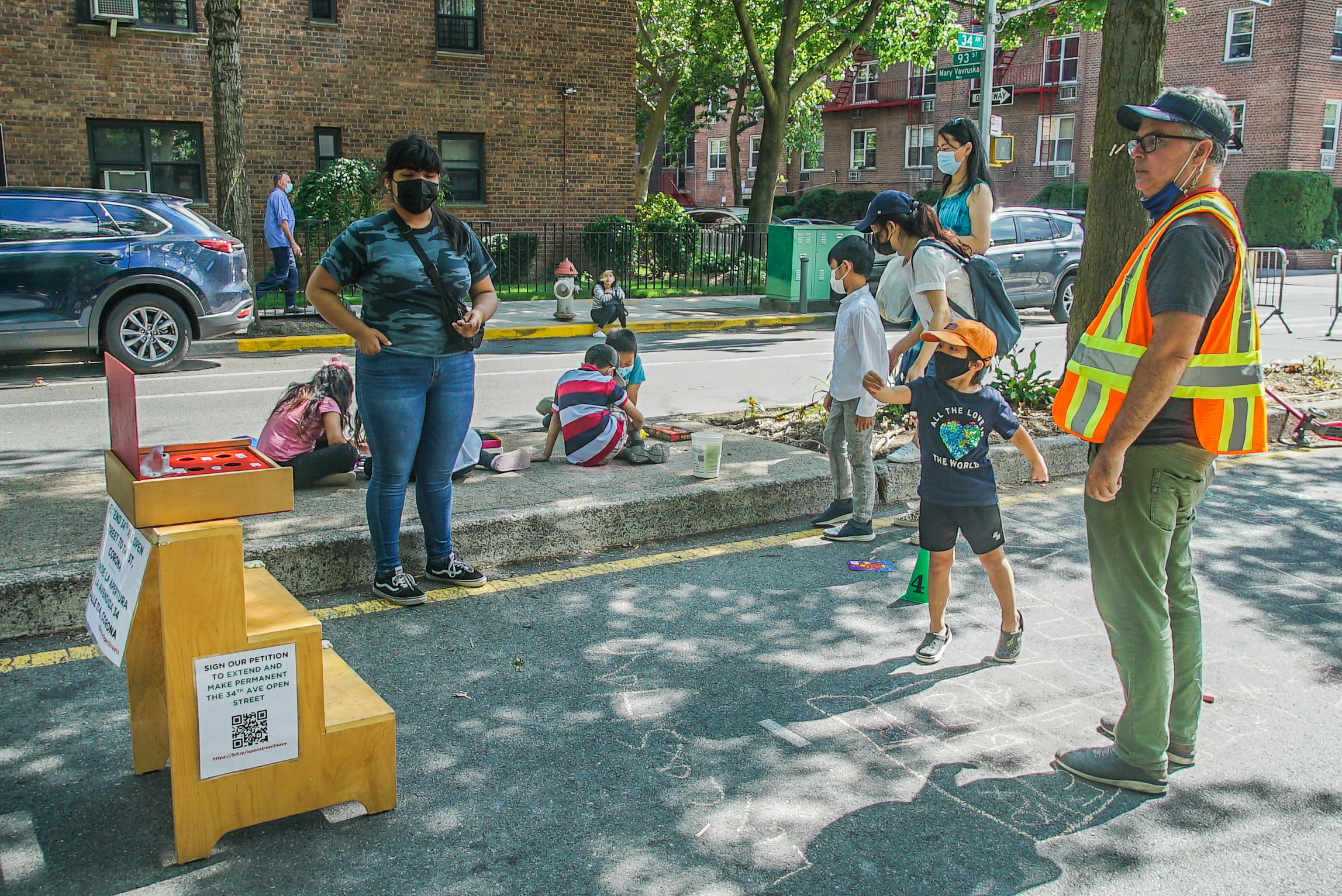
In a couple of weeks, Jim felt more like himself and was back out on the Open Street every day. On a sunny June day in 2021, he donned his usual fluorescent orange, high-visibility safety vest, and headed for 34th Avenue with Oscar. Jim facilitated kids’ activities near the corner of 93rd Street, while Oscar led a salsa class in the middle of the block. They had incorporated an obstacle course into the sapo game - the children had to run between traffic cones and through a hopscotch board before attempting to toss coins into the frog's open mouth.
“We added some extras so the kids can burn more energy,” Jim explained.
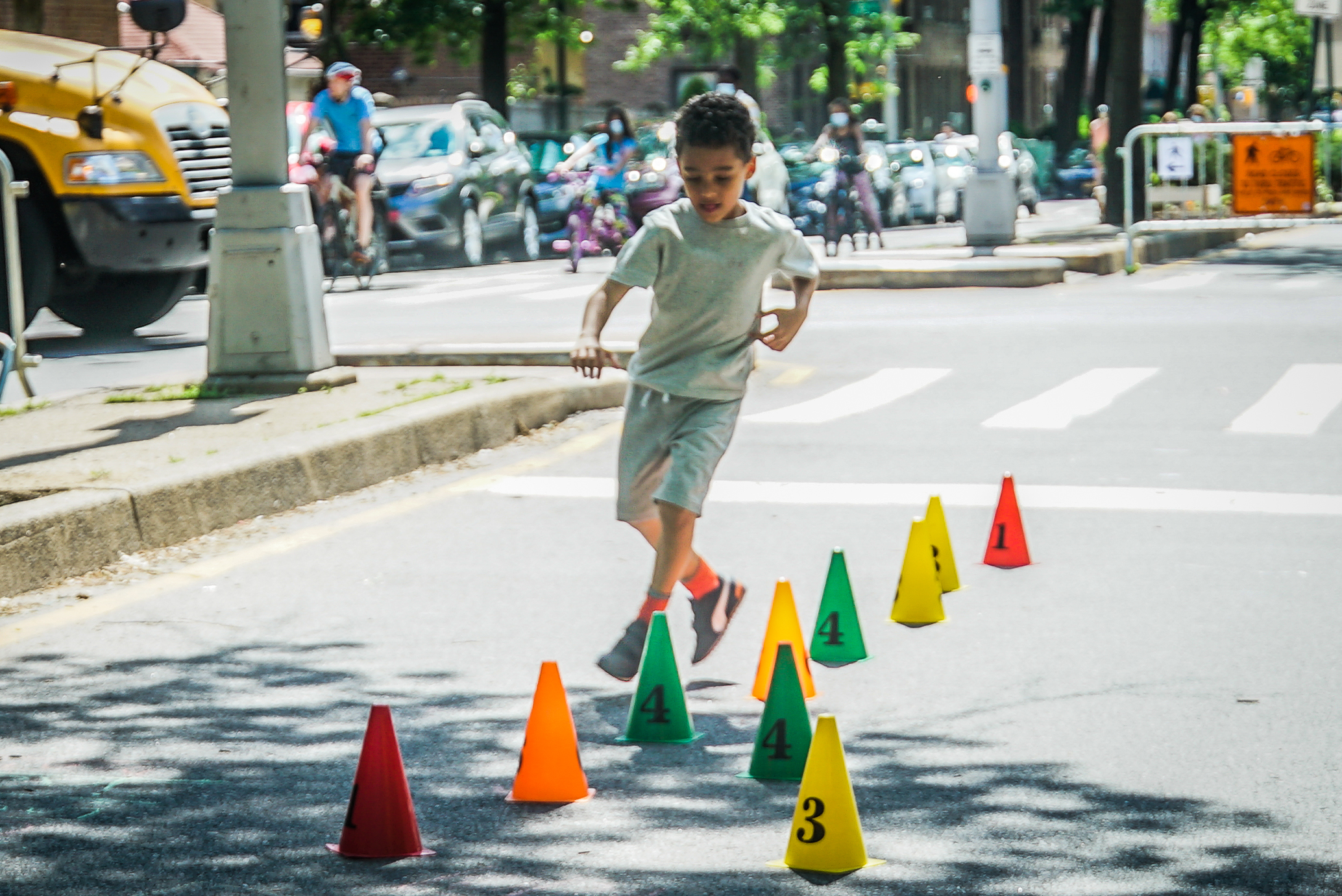
A boy holding one of the coins asked, “Are these made of real gold?”
“I think they’re made out of real brass,” Jim told him.
“What’s brass?”
“Another kind of metal.”
Jim officiated the sapo game, helping kids take turns and keep score, cajoling and encouraging: “Look at Rex! Rex is a pro!” “Oh! So close! So close it hurts!” He laughed.
A father and son riding by on bikes stopped and asked if they could join. “Of course!” said Jim. He explained the rules: “If you get it in the frog’s mouth, you win automatically! You’ll win the day!” The young boy ran through the obstacle course and made his shot. His coins fell inches from the frog. “You got it on the board! Most people don’t even get that," Jim encouraged him. "You get a high five!” The boy jumped up and slapped Jim’s hand.
Children kept coming, and Jim kept the game going late. As one little boy's mother buckled his helmet for the bike ride home, he squealed, “Jimmy! We’re gonna come again next week!”
“You have to do your homework so we can play again!” laughed Jim.
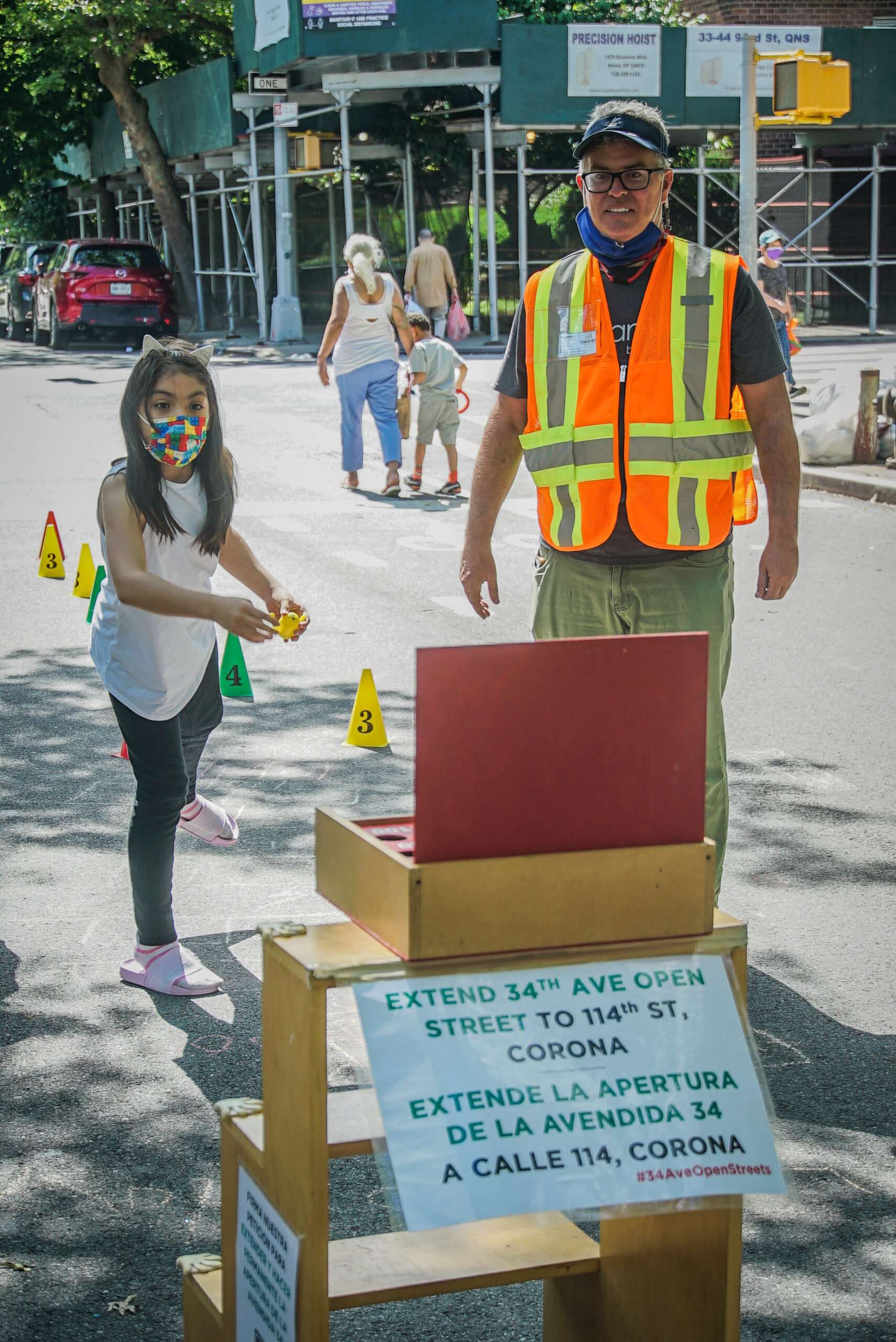
Below, Jim reminisces on his own experiences playing in the street as a child growing up in the Bronx, and reflects on how Open Streets are bringing this back:
Click to Read Transcript
Jim: If you look at the history of New York, you know, more of the years are similar to this year. In other words, cars, maybe in the last 20 or 30 years, sort of monopolized the streets. But before that, you played kick the can, Ringolevio, manhunt, stick ball, stoop ball, tag. You played all those things on the street. We played in the hydrants. You did all those things, for generations and generations. We have a little memory loss the last, maybe, two or three decades, but we all used the streets like that for generations. And it's wonderful to see that coming back.
Bridget: And in your childhood, did you play on the street a lot?
Jim: We owned the streets when we were growing up in the Bronx. Cars had to ask us to please block the water from the hydrant so they could pass. We played ball, we played manhunt, we played kick the can, Red Rover, we played jump rope, in the middle of the streets in the Bronx. And in Rockaway in the summers. That's what you did. Cars did not own the street at that time.
You know, sidewalks in New York City, but particularly here in Jackson Heights, we have some of the most narrow sidewalks in the whole city. It's very difficult to ride your bike on a sidewalk if you're a kid. There's cracks and bumps, and especially if you're trying to learn, it's almost impossible to learn, because you need a smooth surface. And a tree stump, curb cuts, cracks, all those things in the sidewalk make it much more difficult. And so we finally have space in order to do all the things that for generations New Yorkers did, and it's great to get that space back.
The Coalition's first goal was to make people feel safe and welcome using 34th Avenue. Next, they focused on making the Open Street permanent. Now that they have achieved both of these milestones, their next goal is to fortify the streets around schools to protect children on their way to and from school. And after that?
"After making the streets safer, we want an interconnected network, so that theoretically you could hop on your bike, your skateboard, push the wheelchair, go for a walk through all of New York City and stick to an Open Street network, never having to worry about violence from cars, and be able to safely get to your destination, whether you're a jogger or walker or a cyclist," Jim said. "That would be the dream."
Published July 2021